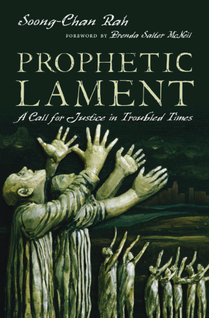Summary of part 2 of Not by the Numbers: The “Be filled in Spirit” Command and the Church-Temple ImageryMost up to date commentaries recognize a relationship between the command to be filled in Spirit (Eph 5:18c) and the following household code (5:22-6:9), although to varying degrees. Specifically, the last of the list of five participles of manner in 5:19-21, modifying be filled in Spirit (v. 18c), is imported into the first of the relationship-trio (wives-husbands). The syntactical relationship between the filling command and the household code, thus, connects the relationship-trio to the filling/fullness/Spirit thread in Ephesians. Furthermore, this syntactical and inter-textual association, then, joins the relationship-trio to the cosmic reconciliation of Messiah’s redemptive action (1:9-10), the Messiah’s subjection of all things in heaven and on earth (1:22-23), and the household-temple-church (2:19-22). This, thus, dynamically relates the Ephesians household code to the nature of the church itself and to the sphere of church growth, which suggest outcomes beyond mere numbers of people in a room at an addressed-church building on one certain day during the week or an the annual average of names on a church roll. *For those following my thoughts on "Church Growth" as I prepare a paper for the upcoming November 2015 annual meeting of the Evangelical Theological Society in Atlanta I post thoughts and drafts of sections of my paper. Other Not by the Numbers posts >>
0 Comments
Biblical social action that reflects advocacy on behalf of the poor--gets your hands dirty and messy9/24/2015  For the church to have a public voice that affects the public square with kingdom values, it needs to have public actions that demonstrate the interests of the community and, in particular, actions that reflect advocacy and social action on behalf of the poor. There will be expected tensions in advocating for the poor in the public square, including opposition from within and from outside the church community. The political process is rarely comfortable for those with deep, conservative biblical convictions and is often beset with estranged alliances and awkward compromises. Additionally, the very poor we seek to serve will not always appreciate or rise up to the advocacy afforded to them. Nonetheless, as Dietrich Bonhoeffer said, we need to “smudge” ourselves with “the hard complexities of the world” [Elshtain’s “Afterward” in Evangelicals in the Public Square by Budziszewski, 197]. *Adapted from chapter 1 of Wasted Evangelism, "Widows in Our Courts." Defining "evangelism" etymologically leans us away from the Bible's own narrative definition9/21/2015  There is a tendency to define evangelism etymologically and stop there. Since the Greek noun euaggelion means “good news” and the Greek verb euaggelizō means “to proclaim the good news,” evangelism, then, is simply “proclaiming the good news.” With this definition, proclamation-centered activities are the valid forms of evangelism: Preaching, teaching, witnessing, or sharing a testimony. The hoped for outcomes of a proclamation-centered evangelism are individual-centered and number-oriented: confessions of faith, increased church attendance, etc. However, does the Gospel narrative itself allow this definition to go unchallenged? The narrow, proclamation-centered definition only succeeds if solely based on word-studies and isolated proof-texts. It is not entirely clear that the NT presents “a vision of evangelism merely from verbal consideration” related to the etymology of the word “evangelism.” The early church, especially reflected in the Gospels, seems more interested in creating a narrative so future church generations could imagine what it means for the gospel of the kingdom to have been inaugurated. Any attempt to develop a coherent theory of evangelism must begin with the implications of the presence of the kingdom, which is wholly constitutive of the gospel. *Adapted from the introduction to Wasted Evangelism: Social Action and the Church's Task of Evangelism.
The word domesticating in the paper’s title has been chosen carefully in referring to the concept of church growth. Obviously, the word choice could be read negatively. The concept of domestication is related to animals that have been tamed for domestic (or household) use, creating a dependency on humans, where, in turn, the animal loses its ability to live in the wild. The word is not chosen, however, to convey control or the taming of church growth, but to reimagine the church experience (i.e., the gathering of believers) as domestic affairs, that is household life and its social relationships. Our passage at hand (5:15-6:9) is not typically considered a church growth text. First, the text does not imply outcomes in numbers attending a “church” and, second, at the application level, the text seems focused on individuals. Typically, the Ephesians 5 filling of the Spirit text is narrowed down to the personal and private spheres of individual Christian faith (“you be filled with the Spirit”) rather than as a corporate reference to the church. Additionally, the haustafeln (i.e., household code) that follows seems—per our experience—to target individuals to behave in specific manners toward others. This straight away biases interpretation of the whole section, which grammatically begins at 5:15 and ends at 6:9. A corporate setting and referent, along with the original (i.e., a different) “church” experience, offers potential reimagining church growth outcomes. It seems we should leverage the intertextual framework in Ephesians within the social-cultural location of its “church” experience and life as experienced in Ephesus rather than one based on our building-centered church experience or our cultural social values today. The liturgical nature of the text of Ephesians suggests a “church” setting. Paul’s emphasis on church as temple (2:17-22) and the Letter’s dynamic referents regarding how contemporary society (at Paul’s time) was sinfully ordered (2:1-3; 4:17-24; 5:3-12, 15; cf. 6:10-13) suggest a potential for church growth outcomes beyond mere numbers in attendance. The social-cultural location is both temple-religious and is domestic: the local church as God’s temple and its house/home setting as “church” experience. *For those following my thoughts on "Church Growth" as I prepare a paper for the upcoming November 2015 annual meeting of the Evangelical Theological Society in Atlanta. Other Not by the Numbers posts >>
It is fairly unavoidable and often nearly impossible to approach Bible texts or biblical topics without some level of bias, not just from denominational tradition or theological inclination, but, even, more so from our regular social experiences (i.e., social mapping) and everyday habits (i.e., social construction).[1] We often begin our understanding of a biblical text or topic within the space our social experiences and habits have created for us, often leading us to confuse application for interpretation.[2] And, as a result, interpretative conclusions, in turn, have an affect on our social relationships—an often-overlooked outcome of interpretation. This can be seen within the arena of church growth. Growth outcomes typically are understood in numbers of people that, correspondingly, affect social relationships. In turn, these outcomes determine particular “church” activities that may include or exclude certain people, by design or by unintended consequence.” Our building-centered church experience, along with its weekly habits, form interpretative bias and project what qualifies as church growth and what activities are determinative to bring such growth. When the topic of church growth is on the table, numbers are the chief and, for most, the sole outcome that is measured.[3] This, however, may very well be formed through our building-centered church experience and habits, rarely questioning the validity of our assumed biblical foundation; thus, biasing how we imagine church growth. Our social mapping (i.e., our social relationships) and our socially constructed building-centered church experience inform as to what qualifies as (or not as) “church growth” texts, providing a grid for acceptable parameters for interpretation. Yet, Paul’s Letter to the Ephesians offers another way to imagine how church growth should be measured. The Ephesians 5 filling command (5:15-21) and the household code that follows (i.e., the haustafeln, 5:22-6:9) is one such overlooked church growth text. The filling of the Spirit (v. 18) is dynamically related to social and domestic relationships implied by the relationship-trio (wives-husbands, children-fathers, slaves-masters), offering another frame for imagining biblical church growth. [1] Berger and Luckman, Social Construction of Reality, 1. [2] See chapter 6 of Wasted Evangelism. [3] Although there are some that point out that growing “spiritually” can be considered church growth, however such growth is typically measured individually, not typically as a church. *For those interested, I like to post drafts of my current research and writing. Here is the introduction to my up-coming paper that I will present at the November (2016) annual meeting of the Evangelical Theological Society in Atlanta, GA. See introduction and thesis >> In light of Mark’s association of the kingdom with the gospel (1:14–15) and the gospel’s programmatic association with the Exodus land-laws [in particular see the connection in the opening (Mark 1:1-3) references to Exod 23:20 and Mal 3:1-5 and the texts surrounding context], I propose that biblical social action is a means to ensure that the blessings and benefits of living in society reach to the poor. Stephen Mott, former Professor of Christian Social Ethics at Gordon-Conwell Theological Seminary, points out that the Bible speaks of what is called “social action” in terms of carrying out justice and caring for the needs of the weak. In her book, Social Justice Handbook, Mae Cannon affirms a similar understanding of the biblical concept of social justice: The resources that God provides were made available to his people from the very beginning. Justice is expressed when God’s resources are made available to all humans, which is what God intended. Biblical justice is the scriptural mandate to manifest the kingdom of God on earth by making God’s blessings available to all (Mae Elise Cannon, Social Justice Handbook, 22). *Adapted from the introduction ("Evangelism and Social Action: An Exegetical Argument") and the 2nd chapter of Wasted Evangelism, "Wasted Evangelism (Mark 4): Social Action Outcomes and the Church’s Task of Evangelism."
This morning as we count the numbers “at” church, let’s remember one of the places where the church is most needed. While I do appreciate a comfortable worship service like most evangelicals on a Sunday morning, the evangelical Christian community should remember, recall it to mind, that it is not sacrifice the Most High seeks, but obedience (1 Samuel 15:22). While ancient Israel worshipped in a temple made with human hands (as we do similarly in our own buildings call "churches" made with human hands), Micah reminded God’s slumbering people:
Even when Jesus was asked about the most important command, Jesus narrowed it down to twins: Love your God with everything you got and love your neighbor as yourself. Nothing about buildings and standing in pew-like rows facing forward toward a group of people or a solo leader singing contemporary choruses with our hands raised and our hearts filled with ease, comfort, and peace. What Jesus did say is to harness what you have, love God and love your neighbor—these are the highest command (together). How can we not see—in the news, on the radio, blog posts, Facebook news items, tweets—that the world is in one of the worst refugee crises since WWII. Between Syria’s civil war (if you can call it that, there are more than two warring factions) and the rise of ISIS, the Middle East and Europe are facing the worst humanitarian disaster in generations. More than 11 million people are displaced, and easily half of these are under the age of 18. Wasted Evangelism aims to post Christian mission agencies and NGOs that are directly serving the current refuge crisis. Please do at least one thing to help in this time of crisis. Pray. Give. Go. Support. Send. Make Aware. Learn.There are, I am sure, more organizations, but these are a start, and ones I could support myself. I will add to the list as time moves forward and I become more aware of them:
|
AuthorChip M. Anderson, advocate for biblical social action; pastor of an urban church plant in the Hill neighborhood of New Haven, CT; husband, father, author, former Greek & NT professor; and, 19 years involved with social action. Archives
February 2024
Categories
All
|
Pages |
More Pages |
|









 RSS Feed
RSS Feed